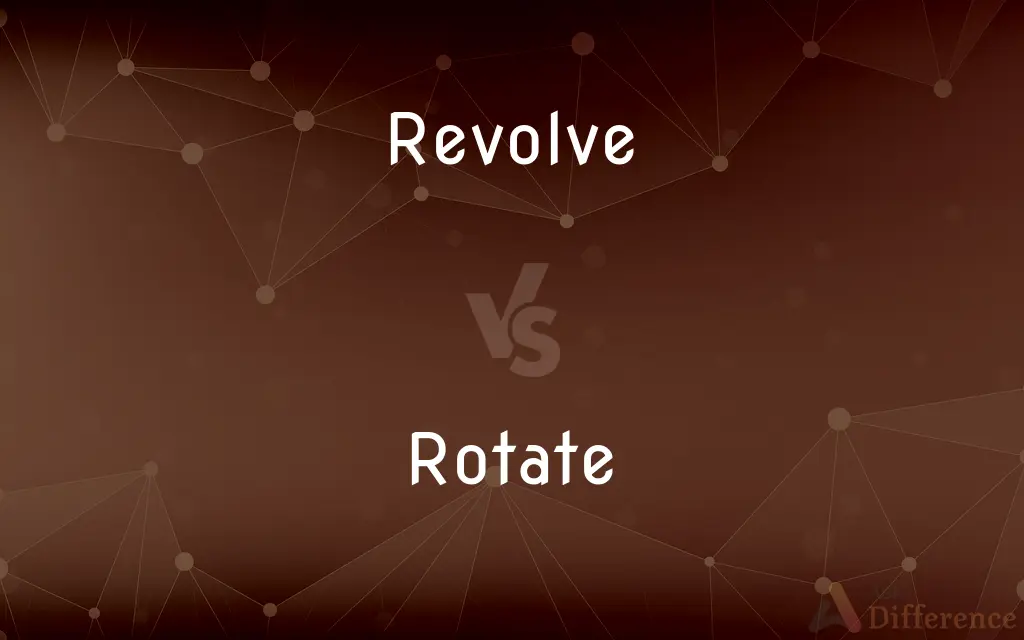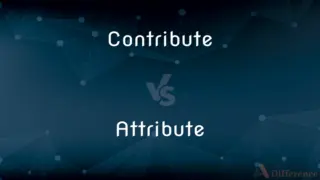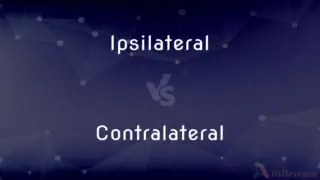Revolve vs. Rotate — What's the Difference?
By Tayyaba Rehman — Updated on October 3, 2023
Revolve means to move in a circular orbit around an external point, while rotate means to spin or turn around an internal axis. Both involve circular motion, but the center of the movement differs.

Difference Between Revolve and Rotate
Table of Contents
ADVERTISEMENT
Key Differences
Revolve and rotate, while sharing the similarity of circular motion, have distinct points of reference. When an object revolves, it moves in a circular pathway around an external point. A classic example is the way the Earth revolves around the Sun, making a complete orbit. In contrast, when an object rotates, it spins or turns on its internal axis. Earth's daily rotation on its axis results in day and night.
Delving further into the concept of revolve, one might think of a satellite revolving around a planet. Here, the satellite's motion is determined by the gravitational pull of the planet, causing the satellite to maintain a set distance and path. On the other hand, rotation can be visualized by thinking of a top spinning. As the top rotates, every part of it turns around its central axis, determining its balance and speed.
Another significant distinction is that an object can rotate without revolving, and vice versa. A spinning basketball on a player's finger rotates on its axis but doesn't revolve around any external point. Conversely, a planet can revolve around a star without necessarily rotating, though in the case of our solar system, planets both revolve and rotate.
In essence, both revolve and rotate describe circular movements, but their points of reference and applications differ. Revolve encompasses orbital movement around an external focus, whereas rotate pertains to spinning around an intrinsic central axis.
Comparison Chart
Definition
Move in a circular orbit around an external point.
Spin or turn around an internal axis.
ADVERTISEMENT
Point of Reference
External point.
Internal axis.
Example in Astronomy
Earth revolves around the Sun.
Earth rotates on its axis.
Mechanical Application
Ferris wheel's cabins revolve around the central support.
A drill rotates to bore into materials.
Motion Relationship
Orbital.
Spinning.
Compare with Definitions
Revolve
Turn on an axis, similar to rotate, but less commonly used in this context.
The door revolved to reveal the other side.
Rotate
Turn around on an axis or center.
The fan rotates to circulate air.
Revolve
To keep returning to a particular place or situation.
His thoughts revolved around the event.
Rotate
Plant crops in a sequence.
Farmers rotate crops to enrich the soil.
Revolve
Continually change position in a sequence.
The menu items revolve weekly.
Rotate
Replace or interchange regularly.
Staff rotate between morning and evening shifts.
Revolve
To orbit a central point
The planets revolve around the sun.
Rotate
Perform a rotation motion.
The gymnast rotates in mid-air.
Revolve
To turn on an axis; rotate.
Rotate
To turn around on an axis or center.
Revolve
To be arranged as revolving credit
His credit line revolves.
Rotate
To proceed in sequence; take turns or alternate
Interns will rotate through the various departments.
Revolve
To be centered
Their troubles revolve around money management.
Rotate
To cause to turn on an axis or center.
Revolve
To cause to revolve.
Rotate
To plant or grow (crops) in a fixed order of succession.
Revolve
To ponder or reflect on
Revolved the matter in his mind.
Rotate
To cause to alternate or proceed in sequence
The coach rotates her players frequently near the end of the game.
Revolve
To bring back into a particular place or condition; to restore.
Rotate
Having radiating parts; wheel-shaped.
Revolve
(transitive) To cause (something) to turn around a central point.
Rotate
(intransitive) To spin, turn, or revolve.
He rotated in his chair to face me.
The earth rotates.
Revolve
(intransitive) To orbit a central point (especially of a celestial body).
The Earth revolves around the sun.
Rotate
(intransitive) To advance through a sequence; to take turns.
The nurses' shifts rotate each week.
Revolve
(intransitive) To rotate around an axis.
The Earth revolves once every twenty-four hours.
Rotate
To lift the nose during takeoff, just prior to liftoff.
The aircraft rotates at sixty knots.
Revolve
(intransitive) To move in order or sequence.
The program revolves through all the queues before returning to the start.
Rotate
(transitive) To spin, turn, or revolve something.
Rotate the dial to the left.
Revolve
To ponder on; to reflect repeatedly upon; to consider all aspects of.
Rotate
(transitive) To advance something through a sequence; to allocate or deploy in turns.
Revolve
To read through, to study (a book, author etc.).
Rotate
(transitive) To replace older materials or to place older materials in front of newer ones so that older ones get used first.
The supermarket rotates the stock daily so that old foods don't sit around.
Revolve
(theater) The rotation of part of the scenery within a theatrical production.
Rotate
(transitive) To grow or plant (crops) in a certain order.
Revolve
(theater) The rotating section itself.
Rotate
Having the parts spreading out like a wheel; wheel-shaped.
A rotate spicule or scale; a rotate corolla
Revolve
(obsolete) A radical change; revolution.
Rotate
Having the parts spreading out like a wheel; wheel-shaped; as, a rotate spicule or scale; a rotate corolla, i.e., a monopetalous corolla with a flattish border, and no tube or a very short one.
Revolve
To turn or roll round on, or as on, an axis, like a wheel; to rotate, - which is the more specific word in this sense.
If the earth revolve thus, each house near the equator must move a thousand miles an hour.
Rotate
To turn, as a wheel, round an axis; to revolve.
Revolve
To move in a curved path round a center; as, the planets revolve round the sun.
Rotate
To perform any act, function, or operation in turn, to hold office in turn; as, to rotate in office.
Revolve
To pass in cycles; as, the centuries revolve.
Rotate
To cause to turn round or revolve, as a wheel around an axle.
Revolve
To return; to pass.
Rotate
To cause to succeed in turn; esp., to cause to succeed some one, or to be succeeded by some one, in office.
Revolve
To cause to turn, as on an axis.
Then in the east her turn she shines,Revolved on heaven's great axile.
Rotate
Turn on or around an axis or a center;
The Earth revolves around the Sun
The lamb roast rotates on a spit over the fire
Revolve
Hence, to turn over and over in the mind; to reflect repeatedly upon; to consider all aspects of.
This having heard, straight I again revolvedThe law and prophets.
Rotate
Exchange on a regular basis;
We rotate the lead soprano every night
Revolve
Turn on or around an axis or a center;
The Earth revolves around the Sun
The lamb roast rotates on a spit over the fire
Rotate
Cause to turn on an axis or center;
Rotate the handle
Revolve
Move in an orbit;
The moon orbits around the Earth
The planets are orbiting the sun
Electrons orbit the nucleus
Rotate
Perform a job or duty on a rotating basis;
Interns have to rotate for a few months
Revolve
Cause to move by turning over or in a circular manner of as if on an axis;
She rolled the ball
They rolled their eyes at his words
Rotate
Turn outward;
These birds can splay out their toes
Ballet dancers can rotate their legs out by 90 degrees
Revolve
Move in an orbit around a central point.
The moon revolves around Earth.
Rotate
Plant or grow in a fixed cyclic order of succession;
We rotate the crops so as to maximize the use of the soil
Revolve
Depend on or center around.
The discussion revolved around the main topic.
Rotate
Turn a position or role to another person in a group.
Duties rotate among team members monthly.
Common Curiosities
Is a revolving door's movement more like revolve or rotate?
A revolving door's movement can be seen as both – it rotates on its axis and revolves around a central point.
Can an object rotate and not revolve?
Yes, an object can rotate on its axis without revolving around another object.
Why is crop rotation beneficial?
Crop rotation helps in maintaining soil fertility and preventing pest infestations.
Can thoughts revolve around a topic?
Yes, it's an idiomatic way to say that thoughts consistently return to or focus on a topic.
What makes planets revolve around stars?
Gravitational forces make planets revolve around stars in orbital paths.
Can the terms revolve and rotate be used interchangeably?
While they have similarities, they usually serve different purposes. Interchanging them might confuse the context.
What objects in our daily life rotate?
Fans, wheels, and drills are a few daily objects that rotate.
Do all planets revolve and rotate?
Most planets both revolve around a star and rotate on their axis, but the duration and manner might vary.
If the Earth didn't revolve, what would happen?
Without revolution, Earth would experience perpetual day or night, depending on its position relative to the Sun.
Does revolving always mean moving in a circle?
In most contexts, yes, but it can also mean focusing on or returning to a subject or idea.
Which takes longer: Earth's rotation or its revolution?
Earth's revolution (365.25 days around the Sun) takes longer than its rotation (approximately 24 hours).
In which context is rotate used in sports?
In sports, players might rotate positions or roles, or a motion like a spin can be called a rotation.
Is the Earth's revolution around the Sun perfectly circular?
No, Earth's revolution is slightly elliptical, not a perfect circle.
How does tire rotation benefit vehicles?
Tire rotation ensures even tire wear, which extends tire lifespan and improves vehicle safety.
How does rotation relate to days and nights?
Earth's rotation causes day and night, with one side facing the Sun (day) and the opposite side in shadow (night).
Share Your Discovery

Previous Comparison
Contribute vs. Attribute
Next Comparison
Ipsilateral vs. ContralateralAuthor Spotlight
Written by
Tayyaba RehmanTayyaba Rehman is a distinguished writer, currently serving as a primary contributor to askdifference.com. As a researcher in semantics and etymology, Tayyaba's passion for the complexity of languages and their distinctions has found a perfect home on the platform. Tayyaba delves into the intricacies of language, distinguishing between commonly confused words and phrases, thereby providing clarity for readers worldwide.














































